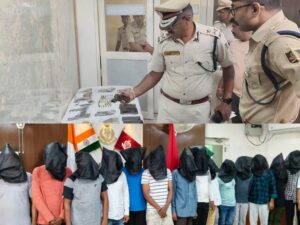Justice for 26/11 Victims: US Supreme Court Denies Tahawwur Rana’s Final Plea Against Extradition to India

US Supreme Court Denies Tahawwur Rana’s Final Plea
New Delhi : In a significant development concerning the pursuit of justice for the 26/11 Mumbai terror attacks, the United States Supreme Court has rejected a final emergency appeal from accused conspirator Tahawwur Rana, effectively clearing the last major legal hurdle for his extradition to India. This decision brings the 64-year-old Canadian citizen one step closer to facing trial on Indian soil for his alleged role in the devastating 2008 attacks.
Tahawwur Rana, a businessman of Pakistani origin formerly based in Chicago, has long been implicated in the 26/11 Mumbai attacks due to his association with David Coleman Headley, a key plotter who conducted reconnaissance of targets in Mumbai prior to the siege. Headley used Rana’s immigration consultancy business as a cover during his surveillance activities. The horrific attacks, orchestrated by the Pakistan-based Lashkar-e-Taiba (LeT), unfolded over three days starting November 26, 2008, resulting in the deaths of 166 people, including numerous foreign nationals, across multiple locations in Mumbai.
While Rana was not charged in the US for direct involvement in the Mumbai plot, he was convicted in 2011 for providing material support to LeT and for conspiracy related to a separate planned attack in Denmark. He received a 13-year prison sentence and is currently held at the Metropolitan Detention Center in Los Angeles.
India has been seeking Rana’s extradition to prosecute him for his alleged involvement in the Mumbai conspiracy. The process gained momentum when the US government, under then-President Donald Trump, approved India’s extradition request. President Trump announced this decision during Prime Minister Narendra Modi’s visit.
Following the US government’s approval, Rana mounted several legal challenges to prevent being handed over. His efforts included filing an “Emergency Application For Stay Pending Litigation of Petition For Writ of Habeas Corpus.” This plea was initially directed to Supreme Court Associate Justice Elena Kagan, who denied it in early March 2025. Rana subsequently renewed his application, requesting it be considered by Chief Justice John G. Roberts Jr.
In his arguments against extradition, Rana claimed a high likelihood of torture in India due to his background (Muslim, Pakistani origin, former Pakistan army officer) and cited a UK court’s decision regarding arms dealer Sanjay Bhandari as precedent. These arguments, however, ultimately failed to sway the US courts.
The matter reached its conclusion recently when the US Supreme Court formally denied Rana’s renewed emergency application. A notice on the court’s website confirmed the denial, exhausting Rana’s legal avenues within the US judicial system to block his extradition. This decision follows earlier rejections of his pleas, including one by the Supreme Court in January 2025.
With the US Supreme Court’s final refusal to intervene, the path is now clear for Rana’s transfer to Indian custody. Officials from India’s National Investigation Agency (NIA) anticipate that US authorities, likely the FBI, will soon finalize the arrangements for handing Rana over.
This extradition holds significant importance for India. It will mark the first time Indian agencies can directly question Rana about the broader conspiracy behind the 26/11 attacks. Investigators hope to gain crucial information regarding the specific roles played by conspirators based in Pakistan, including potential involvement of elements within the Pakistani military and intelligence services (ISI), who have long been suspected of overseeing and funding the operation. Once in India, Rana is expected to be taken to Mumbai, the site of the attacks and where his business was used as a cover, potentially aiding further investigation.
The US Supreme Court’s decision represents a critical milestone in the long and complex effort to bring all individuals involved in the 26/11 Mumbai terror attacks to justice. While the handover logistics are yet to be finalized, the denial of Rana’s final plea removes a major obstacle, paving the way for him to finally face trial in India for his alleged part in one of the most tragic events in the nation’s recent history.






